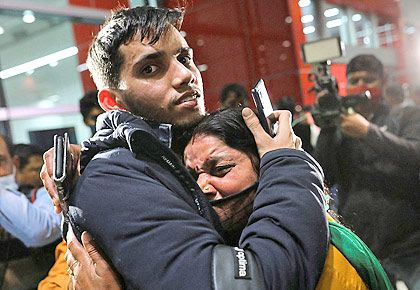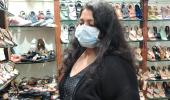'Our future is in limbo. The government saved us with Operation Ganga; now, they must save our careers.'

On February 24, 2022, Russia invaded Ukraine. Nearly eight months later, the war continues, causing irreparable damage to Ukraine and its citizens.
There were 18,000 Indian students studying medicine in Ukraine when the war broke out.
Most of these students had cleared NEET (the National Eligibility Entrance Test, the all India pre-medical qualifying exam for those who want to pursue their education in the field of medicine) but could not get admission at a government medical college.
Since studying at a private medical college in India was beyond their financial reach, they chose to study in Ukraine where the cost of a medical education is much cheaper.
The war has now left them worried about their future.
After returning safely to India, they attended online classes for a while but are currently on a break.
They have to pay the fee for the next semester, which began last month. If they don't, their names will removed as students from their respective universities in Ukraine.
Unlike during the pandemic, there is no concession in the fee amount.
The students have protested several times in Delhi, asking the government to help. So far, they have not received a clear response.
A Ganesh Nadar/Rediff.com caught up with six such students. Here's what they had to say:
'I cannot transfer to any other university'
Nimisha Lumba, 19
Delhi
First year student
I was in Ukraine for only three months. Life was good there as it is a European country and the standard of living is good. The tuition fee is also cheaper.
I was studying in Kharkiv.
After the war began, we knew we had to return to India. We left our home, walked 25 kilometres, then boarded a bus to the Romanian border. All through, the bombing was going on.
I flew back to India from Romania.
I attended my first semester in Ukraine and the second semester online. My second year classes will start after the vacation. My practical classes will start in the third year.
As I am a first year student, I cannot transfer to any other university.
Even though I am attending online classes, I will have to pay the full fee for the second year.
I have already paid for a six year visa and for my medical insurance for six years.
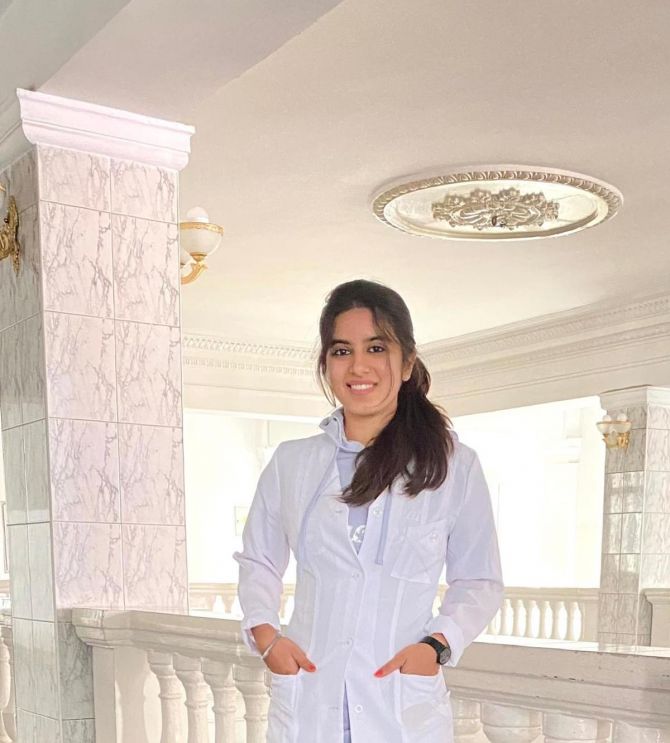
'I have no idea when my third year classes will begin'
Gracy Arora, 20
Indore
Second year student
Life in Ukraine is difficult there because their culture is different.
In winter, temperatures go down to -20 degrees which is very cold for us.
I was studying in Vinnytsia. You don't get Indian food there, so, besides attending classes and doing homework, we had to cook too.
There, 100 per cent attendance is compulsory. If you miss even one lecture, you get into a lot of trouble and have to attend it again.
The teachers there teach a group of 10 students at a time, so we get a lot of personal attention.
While they speak English, you need to know Ukrainian -- which is similar to Russian -- to interact with the local people.
Knowing the language becomes even more important when you start attending clinics; you can't treat patients if you don't understand what they are saying.
I was in Ukraine for two years.
When the war started we spent four days in a bunker. Then, a 16 hour bus ride took us to the Romanian border. It was very crowded and snowing heavily. The army was shooting in the air to maintain discipline.
I showed my passport to the army officer who was on duty at the border post; he pushed me across.
I stayed in a shelter in Romania for five days; the Romanians took good care of us. I flew back from Bucharest.
I was in the last semester of my second year when the war began. I completed the semester from here by attending online classes. Now, there is a break that has been extended because of the war.
I have no idea when my third year classes will begin. When it does, we will have to pay the fees. We will also have to pay the hostel fees since our belongings are still there.
They might give us a concession; at least, that's what I am hoping.
During my first year, I paid $8,000 (approximately Rs 645,000) as fees; my other expenses came up to $12,000 (approximately Rs 967,000).
The second year, my fees were $5,000 (approximately Rs 403,000); my expenses totalled up to $10,000 (approximately Rs 806,000).
We are hoping to attend online classes and get a chance to do our clinical observership here.
In Ghana, Egypt and Pakistan, they conducted exams for students returning from Ukraine after which they were allowed to study in the local colleges.

'The NMC has given us no relief'
Harsh Goyal, 21
Muzzafarnagar
Has completed his third year
I wanted to study medicine, but was only getting admission in BDS (bachelor of dental surgery). So I decided to study in Ukraine.
I was studying in Ivano-Frankivsk. Life there was all about studies. Between attending classes and doing our homework, we had barely any time left for any kind of social life.
I was there two years. In between, during the Covid pandemic, I came back for some time and attended online classes.
When the war started, I was in Ukraine. Our studies were disturbed. There was additional tension because my family kept calling me; they wanted me to come back.
Soon, our classes were being held online.
We live on the eighth floor and would hear the sounds of the siren throughout the day. Three missiles fell in our city. There was fear all around. Everyone panicked.
On February 23, the university told us we could go back home, attend online classes for two weeks and then return. We were not sure what to do and remained there.
Managing everything was difficult. Once, when we went out to buy groceries, the shop would not accept debit cards. I had to stand in line at an ATM for three hours to withdraw cash. It then took me two hours to buy the groceries and return as there was no public transport.
After 8 pm, there would be a blackout and we could not go out. One of us kept awake in case the sirens started; when that happened, we had to go to the nearest bunker.
Once the wing of a Russian plane fell down near our building and caught fire. We saw Ukrainian tanks.
We realised we were not safe there any more and decided to shift to a friend's house.
As we reached the ground floor, the sirens went off. We left our luggage outside the building and rushed to the bunker with one bag only. After the all-safe sounded, we took a cab to our friend's place.
Soon, it was not safe to stay in the city. Fifty students booked a bus to the Romania border. We reached there in three hours.
We had placed the Indian flag on the bus and nobody stopped us.
The bus dropped us 15 km from the border. The roads were jam-packed with people and vehicles. We walked to the border and joined the Indian line which was three km long.
We stood in that line for three days. The temperature was minus seven degrees and it was snowing.
I was crying by then. I had broken down completely; my legs felt like they would give way.
We crossed the border at 2 am. Kind-hearted Romanian citizens fed us.
Our embassy officials reached at 4 pm. They had arranged for a double-decker bus that could accommodate 80 students.
We stayed in a sports complex for three days; the Romanians looked after us very well.
We flew out from Bucharest airport. The Indian Air Force brought us back.
I reached India on March 4 and attended online classes for my third year. We have been on a break since July.
In three years, I have spent Rs 20 lakhs (Rs 2 million) in Ukraine.
I have approached our member of Parliament for help. We have protested many times in Delhi. We have protested in front of the office of the National Medical Council.
Our dreams are crumbling in front of us. I am depressed.
The NMC has given us no relief. They have said we cannot transfer to other universities.
Our future is in limbo. The government saved us with Operation Ganga; now, they must save our careers.
We have approached the Supreme Court and are waiting for the verdict.
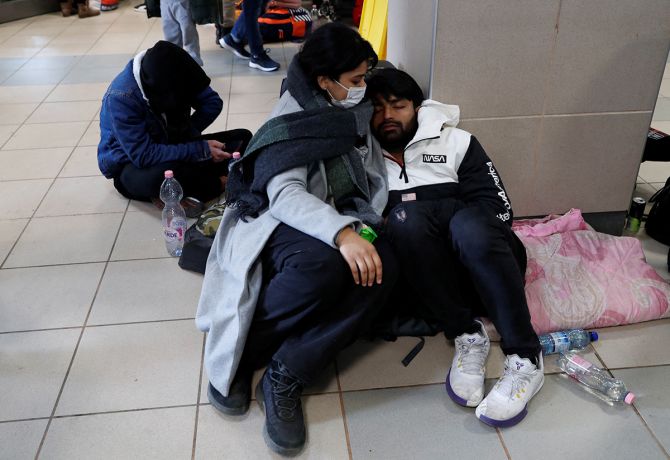
'If the government doesn't help, our dreams will collapse'
Shalini Chauhan, 24
New Delhi
Has completed her third year
Though I got more than 500 marks in NEET in 2019, I did not get a seat in a government medical college. The cut off is very high in the general category. I was getting admission in BDS but I was not interested.
I could not afford a private medical college and so I chose to go to Ukraine to study.
I have been there for three years.
In my second year, I had to attend online classes from here as we had come back during the Covid pandemic. Doing so did not pose any problems as our studies at that stage were theoretical.
I studied at the State Medical University in Zaporizhzhia. The teachers were very helpful.
I had no social life there. My focus was only on my studies. We had to cook our own food. Though it was very cold outside, all buildings had heaters inside.
I came back during Operation Ganga. Our agent in India, Divya, guided us.
At first, only 10 students went to the Hungarian border; they showed us the way. After that 1,500 of us came in a train. The journey to the border lasted 36 hours.
Then, there was a four hour train ride from Zahony to Budapest. After three days, we flew back here and attended online classes.
I have been part of the signature campaign, hunger protest and other protests to draw the government's attention to our plight.
I have spent about Rs 30 lakhs (Rs 3 million) for my education in Ukraine. My parents are worried about my safety; they say they won't send me back even if the war ends.
If the government doesn't help, our dreams will collapse.
Those who have gone to study in Ukraine belong to middle class families; many of us have taken bank loans in order to do so.
I can transfer to another university as I have completed my third year. But I cannot do my fourth year classes online.
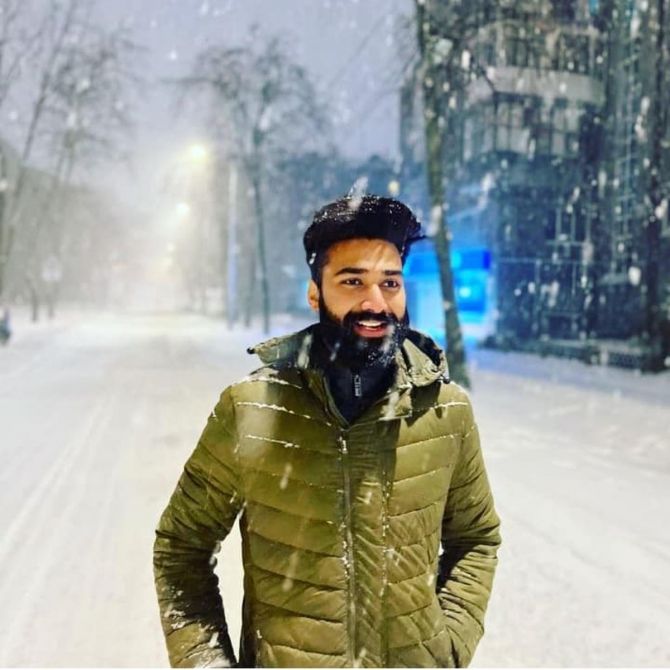
'There are no seats for us in India'
Ritvik Varshney, 23
Aligarh
Has completed his fourth year
I have been studying in Ukraine for four years. The education there is good as is the European standard of living.
I was studying in KharkThe people there don't interfere with us. Shopkeepers treat us like they treat everyone else. They don't overcharge us.
After the war began -- Russia is just 41 kms from Kharkiv -- the Ukrainian citizens started hating us because India remained neutral about the invasion.
I remember the time the bombing first started; it was 5 am. The siren sounded and we rushed to the nearest bunker; we were there for eight days.
When we could leave, we walked to the nearest railway station. The Ukrainians were allowed to board first, then it was our turn.
It was a 1,200 km journey. There was no place to sit so we stood for 22 hours.
After we got down from the train, we hired a bus to the Hungary border. We had to pay Rs 1.5 lakhs (Rs 150,000) for the 400 km journey. After we reached the border, it took us eight hours to cross into Hungary.
We met our embassy officials there. They took us in a train to Budapest, which took another eight hours.
We flew back in an Indian Air Force plane. I brought my pet rabbit with me.
Since I returned to India, there have been no online classes.
I have met my MP, my MLA and some ministers. We have submitted letters requesting help but there has been no response. We even protested outside the NMC office.
So far I have spent around Rs 25 lakhs (Rs 2.5 million) on my medical studies.
I have two years left for my MD degree.
I am allowed to transfer, but it is not easy to get admission in a different university. Also, studying in a different country means learning a different language. We need to know the local language to speak to patients.
I am waiting for the war to end.
I am waiting for the Supreme Court to help us.
Foreign students are studying here in India, but there are no seats for us.

'We are not allowed to transfer to an Indian university'
Dr Rajesh Bhat
Vadodara
His son is in the fifth year of his medical education
Nearly 15 lakh (1.5 million) students appear for NEET for the 91,000 seats that are available. With 49 per cent reservation for different castes, 10 per cent reservation for the economically weaker sections and a 15 per cent management quota in private colleges, getting admission in the open category is very difficult.
As the fee structure is very high in private colleges here, I sent my son to Ukraine to study medicine.
The course there costs Rs 300,000 to Rs 400,000 a year; here, it is Rs 16 lakhs (Rs 1.6 million) a year.
My son is in his fifth year. I have spent around Rs 25 lakhs on his medical education so far.
When Covid struck, I had to charter a flight to bring him back.
Just before the war started, he came back on a commercial flight. This was before Operation Ganga began.
He has to still complete his fifth and sixth years, which is not possible online. Though he can transfer, other countries are more expensive.
Many students have taken bank loans to study medicine in Ukraine. Transferring to another country will increase that burden. We are not allowed to transfer to an Indian university.
Why can't the government use the services of these senior students from Ukraine? After all, we need doctors in government hospitals.
We are prepared to pay the government college fees.
We have petitioned the Supreme Court to consider the plight of students who have returned from Ukraine.
The government has to do something. They are not even ready to meet us.
I had even suggested that the students can join in a class one year lower.
About 4,000 students who were in their sixth year in Ukraine were allowed to complete their internship in India by the NMC.
We need to admit only 24 students from Ukraine in every medical college and all of them will be absorbed.
